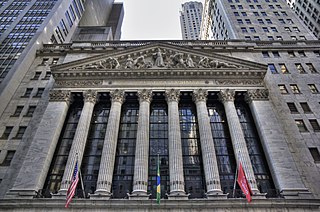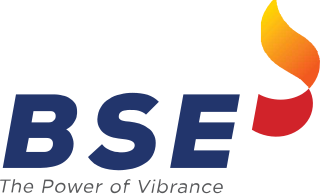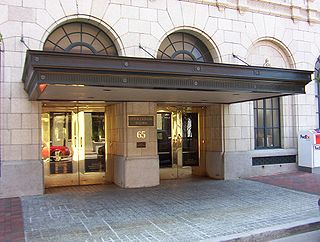Related Research Articles

A stock exchange, securities exchange, or bourse is an exchange where stockbrokers and traders can buy and sell securities, such as shares of stock, bonds and other financial instruments. Stock exchanges may also provide facilities for the issue and redemption of such securities and instruments and capital events including the payment of income and dividends. Securities traded on a stock exchange include stock issued by listed companies, unit trusts, derivatives, pooled investment products and bonds. Stock exchanges often function as "continuous auction" markets with buyers and sellers consummating transactions via open outcry at a central location such as the floor of the exchange or by using an electronic system to process financial transactions.

A commodity market is a market that trades in the primary economic sector rather than manufactured products, such as cocoa, fruit and sugar. Hard commodities are mined, such as gold and oil. Futures contracts are the oldest way of investing in commodities. Commodity markets can include physical trading and derivatives trading using spot prices, forwards, futures, and options on futures. Farmers have used a simple form of derivative trading in the commodities market for centuries for price risk management.

In finance, speculation is the purchase of an asset with the hope that it will become more valuable shortly. It can also refer to short sales in which the speculator hopes for a decline in value.
In finance, a futures contract is a standardized legal contract to buy or sell something at a predetermined price for delivery at a specified time in the future, between parties not yet known to each other. The item transacted is usually a commodity or financial instrument. The predetermined price of the contract is known as the forward price or delivery price. The specified time in the future when delivery and payment occur is known as the delivery date. Because it derives its value from the value of the underlying asset, a futures contract is a derivative.
A futures exchange or futures market is a central financial exchange where people can trade standardized futures contracts defined by the exchange. Futures contracts are derivatives contracts to buy or sell specific quantities of a commodity or financial instrument at a specified price with delivery set at a specified time in the future. Futures exchanges provide physical or electronic trading venues, details of standardized contracts, market and price data, clearing houses, exchange self-regulations, margin mechanisms, settlement procedures, delivery times, delivery procedures and other services to foster trading in futures contracts. Futures exchanges can be integrated under the same brand name or organization with other types of exchanges, such as stock markets, options markets, and bond markets. Futures exchanges can be organized as non-profit member-owned organizations or as for-profit organizations. Non-profit, member-owned futures exchanges benefit their members, who earn commissions and revenue acting as brokers or market makers; they are privately owned. For-profit futures exchanges earn most of their revenue from trading and clearing fees, and are often public corporations.

The Chicago Board of Trade (CBOT), established on April 3, 1848, is one of the world's oldest futures and options exchanges. On July 12, 2007, the CBOT merged with the Chicago Mercantile Exchange (CME) to form CME Group. CBOT and three other exchanges now operate as designated contract markets (DCM) of the CME Group.

The Commodity Futures Trading Commission (CFTC) is an independent agency of the US government created in 1974 that regulates the U.S. derivatives markets, which includes futures, swaps, and certain kinds of options.

BSE Limited, also known as the Bombay Stock Exchange (BSE), is an Indian stock exchange with highest number of companies which is located on Dalal Street. Established with the efforts of cotton merchant Premchand Roychand in 1875, it is the oldest stock exchange in Asia, and also the tenth oldest in the world. The BSE is the world's 6th largest stock exchange with a market capitalization exceeding US$5 trillion on May 21, 2024.
In finance, a single-stock future (SSF) is a type of futures contract between two parties to exchange a specified number of stocks in a company for a price agreed today with delivery occurring at a specified future date, the delivery date. The contracts can be later traded on a futures exchange.

The New York Cotton Exchange (NYCE) is a commodities exchange founded in 1870 by a group of one hundred cotton brokers and merchants in New York City. In 1998, the New York Board of Trade (NYBOT) became the parent company of the New York Cotton Exchange, and it is now owned by IntercontinentalExchange (ICE).

Zhengzhou Commodity Exchange, established in 1990, is a futures exchange in Zhengzhou, one of the four futures exchanges in China. The ZCE is under the vertical management of China Securities Regulatory Commission (CSRC).
The Dalian Commodity Exchange (DCE) is a Chinese futures exchange based in Dalian, Liaoning province, China. It is a non-profit, self-regulating and membership legal entity under the China Securities Regulatory Commission (CSRC), established on February 28, 1993.

The Memphis Cotton Exchange is located in downtown Memphis, Tennessee, United States, on the corner of Front Street and Union Avenue. It was founded in 1874 as a result of the growing cotton market in Memphis, where trade was strong after the American Civil War. The first Cotton Exchange building was constructed in 1885. It was replaced by the Exchange Building in 1910, which housed it until a newer Cotton Exchange Building was completed in 1925.

Multi Commodity Exchange of India (MCX) is a commodity exchange based in India. It was established in 2003 and is currently based in Mumbai. It is India's largest commodity derivatives exchange. The average daily turnover of commodity futures contracts increased by 26% to ₹32,424 crore during FY2019-20, as against ₹25,648 crore in FY2018-19. The total turnover of commodity futures traded on the Exchange stood at ₹83.98 lakh crore in FY2019-20. MCX offers options trading in gold and futures trading in non-ferrous metals, bullions, oil, natural gas, and agricultural commodities.
The Forward Markets Commission (FMC) is the regulatory body for the commodity market and futures market in India. It is a division of the Securities and Exchange Board of India, Ministry of Finance, Government of India. As of July 2014, it regulated Rs 17 trillion worth of commodity trades in India. It is headquartered in Mumbai and this financial regulatory agency is overseen by the Ministry of Finance. The Commission allows commodity trading in 22 exchanges in India, of which 6 are national.
An exchange, bourse, trading exchange or trading venue is an organized market where (especially) tradable securities, commodities, foreign exchange, futures, and options contracts are bought and sold.
Matka gambling or satta is a form of betting and lottery which originally involved betting on the opening and closing rates of cotton transmitted from the New York Cotton Exchange to the Bombay Cotton Exchange. It originates from before the Partition of India when it was known as Ankada Jugar. In the 1960s, the system was replaced with other ways of generating random numbers, including pulling slips from a large earthenware pot known as a matka, or dealing with playing cards.
Live cattle is a type of futures contract that can be used to hedge and to speculate on fed cattle prices. Cattle producers, feedlot operators, and merchant exporters can hedge future selling prices for cattle through trading live cattle futures, and such trading is a common part of a producer's price risk management program. Conversely, meat packers, and merchant importers can hedge future buying prices for cattle. Producers and buyers of live cattle can also enter into production and marketing contracts for delivering live cattle in cash or spot markets that include futures prices as part of a reference price formula. Businesses that purchase beef as an input could also hedge beef price risk by purchasing live cattle futures contracts.
Ratan Khatri was an Indian gambling kingpin, widely regarded as the "Matka King" for his central role in transforming matka, a form of betting, into one of the most lucrative underground industries in India. Born in Karachi, British India, Khatri migrated to Mumbai during the Partition of 1947. Over several decades, he established a nationwide gambling network that became synonymous with his name and legacy.
References
- 1 2 "What is Satta Matka?". The Times of India . 2019-02-13. ISSN 0971-8257 . Retrieved 2024-05-13.
- ↑ "How commodity futures market was born in India". Rediff.com . 22 May 2007. Retrieved 2024-05-13.